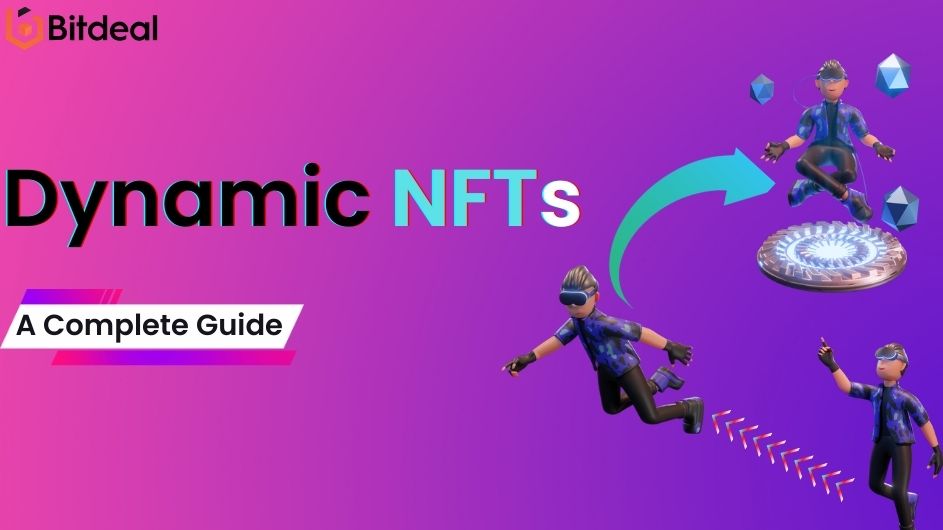Blog | NFT
What are Dynamic NFTs? - A Mere Future of NFT To Adopt
Dynamic NFTs are possessing the ability to change their metadata & adapt themselves to multiple environments. Check out what is Dynamic NFT & how it works.
- Blogs

Dynamic nft complete guide

NFT
Non-Fungible Token also known as NFT is a blockchain-based token that represents a unique digital asset. NFT has distinctive features, where flexibility is used to attach data, files, images, links, and other required information with the token metadata. NFTs have the quality to represent virtual as well as physical assets. Token ID and metadata are permanently registered after minting NFTs. NFT is inherently static by design.
What is Dynamic NFT?
Dynamic NFT (dNFT) is a Non-Fungible Token (NFT) that encrypts smart contract logic. The main reason to convert your NFTs to dynamic is, as it comes up with new use cases where NFTs can respond and react to changes that happen externally. With dynamic NFT, altering metadata is made easier. It automatically changes its metadata based on certain external conditions. Dynamic NFTs provide a space for innovation. The feature of flexibility creates an opportunity to come up with new strategies for distributing and creating content. Users are given limitless options to design their own dynamic NFTs with ingenious ideas.
Dynamic NFT vs Static NFT
Dynamic and Static NFTs are Non-fungible tokens that compete with each other and they both have their own advantages, flaws, and use cases.
Static NFTs are non-fungible digital assets with permanent token data and features that are always stored in the blockchain ledger. It provides enhanced security and trust. This is mostly unchangeable and it comes with better flexibility.
Dynamic NFTs are non-fungible tokens where the metadata token can be altered with its high flexibility. In dNFTs, the data and characteristics undergo constant change due to external forces. Hence, it is suitable for use cases that mandate frequent changes in data.
How Dynamic NFT Works?
Smart contracts are integral prerequisites to bring out required changes in dynamic NFTs with on-chain as well as off-chain computation. Once a request is created on dynamic NFT, the smart contract evaluates on-chain and off-chain data to determine the result. Hence the changes done in dynamic NFT rely on the conditions framed in the smart contract.
To make it simple, when a non-fungible token is requested, the on-chain and off-chain data are evaluated by smart contracts to prepare a response to showcase in front of users. The understanding of dynamic NFTs is made simple with its easy workflow.
Generally, performing a dynamic NFT process basically, it requires, both on-chain & off-chain data, and smart contracts.
- When a request is raised for a dynamic NFT, the smart contract will quickly initiate a metadata change request for the desired NFTs.
- Next, the smart contract makes a call to recall the data stored on the on-chain
- Moving toward the result, smart contract uses an oracle to call for off-chain data.
- After the call, both on-chain and off-chain data are evaluated.
- Finally, the smart contract returns the media to the user who made a request.
To make it clear, a smart contract is a feature that helps NFT to change, expand, and update over a period of time. A non-fungible token can be changed only when the smart contract permits. Only then alterations are made in the metadata of respective Dynamic NFT based on the on-chain and off-chain.
Step-by-Step Process to Create Dynamic NFT
Bitdeal creates Dynamic NFTs. A simplified version of the development is given below.
- Initiate the ERC721 token
- NFT image links to be uploaded in the IPFS URIs
- Complete a compile test
- Create the NFT contract “Keepers Compatible”
- Keep the smart contract interactive with Chainlink Price feeds that help in changing the NFTs based on your specified variables (in this case, market prices).
- Test your dNFT to check whether it is dynamically updating as predicted.
- Mint and launch your dNFT
On the other hand, bitdeal has its own automatic updatable dynamic NFT APIs which will take care of the dynamic NFT change requests & update its metadata according to the request initiated.
Advantages of Dynamic NFTs
Dynamic NFTs are effortlessly gaining importance and it has evolved as the next phase of NFT. Dynamic NFTs have many use cases concerning the future of blockchain and the decentralized web. The new NFTs merge the uniqueness of non-fungible tokens with the flexibility to add dynamic data inputs. Given below are the most prominent benefits that users gain by employing dynamic NFTs.
- Innovation
- Immersive Experiences
- Better Engagement
- Enhanced Loyalty
- Easygoing Monetization
Things To Keep In Mind
Many people can think that dynamic NFTs are affecting the nature of the classic NFTs which are used now, But many people are requesting dynamic NFTs and Multiverse NFTs. Multiverse NFTs is a growing concept that will achieve their full potential of the NFTs. These dynamic NFTs can be the beginning or base of that.
Dynamic NFTs are very secure, they just change only their metadata which has rooms within its own, hence the natural structure of the NFT will be unique just as same as the static NFT.
Bitdeal is a leading NFT Development Company providing all services related to NFTs. If you are curious and creative in changing your ideas into reality then this is the apt time to make a shift from NFT to dynamic NFT as it has evolved by replacing all the flaws by using smart contracts effectively. Feel free to reach us and our tech team will guide and support you with primary consultations.
Get A Demo
We are glad to announce that, Bitdeal is making one more milestone in its journey. As Web3 technologies becomes more dominant and lucrative, bitdeal sets its footmark in AI and Gaming Space. Explore our all-new AI and Gaming Solutions below here.